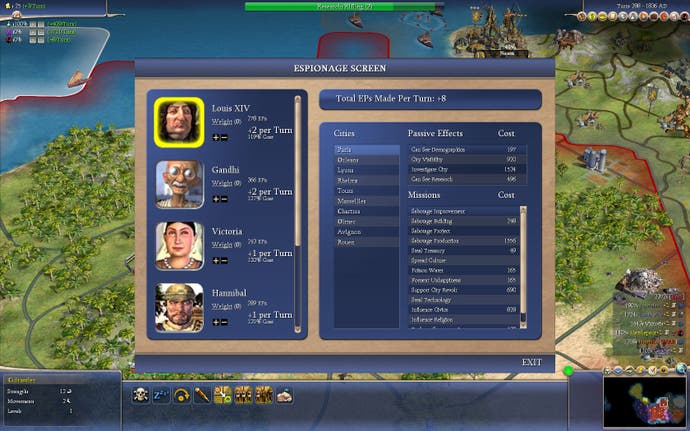Civilization IV: Beyond The Sword
Now more Civilized than ever.
Corporations, meanwhile, help achieve economic victory. No doubt knowingly so (Civ IV is, after all, a game that displays a picture of Al Gore to denote the internet and in which Mount Rushmore can only be built once you've discovered fascism), it's essentially the religion mechanic repainted . Your agents spread the word in other nations, only wherever they successfully convince the locals of their cause's worth, they'll yield coin rather than influence. They're also a means of converting less useful or even obsolete resources into more valuable ones or positive effects for their host city, bringing stuff back into play that's often abandoned by the late stage of the game Corporations come into play in.
It's a sly and fascinating addition, but founding each of the seven corps is aggravatingly exact in its requirements - the right Great Person and the right resources. While you might end up with one or two by luck, actively seeking a corporation is really only a task for someone who feels they've mastered Civ IV. Really, that's the kind of expansion pack this is - layering on artful intricacies to bring back now those bored of the original game. The great strides of accessibility Civ IV made over its predecessors aren't the focus here. This cheerfully makes the game more terrifying to those who already cringe at its complexity, and in that respect is grist to the mill of those who troll the EG comments thread for any and every PC game review to make disparaging remarks about the platform.
What haven't I talked about yet? Oh, so very much. The random events are a neat touch - natural disasters that can damage your cities or improvements, but persecute the other Civs with equal frequency. In that event, you'll be given the option of whether to send help to an afflicted rival, which offers a sporadic but useful extra way to cement diplomatic ties. Which might then be severed when an arranged marriage to one of their noblemen falls through. These events rarely change the outcome of the game, though they certainly spice it up a bit, but they could be said to be a little too random. The arranged marriage thing, for instance, is a nice idea, but can grate a little because you've had nothing to do with the marriage, and suddenly an already highly-strung civ is mad at you through no fault of your own.

Most of the events comprise only a small text-box with a short list of response options, so this is an addition that feels a tad slapdash compared to the others. More, they can upset a careful strategy - an annoyance for cheerless Civ purists, but like espionage and corporations, do help liven up an already excellent game in danger of being played to death. Much of the time, they make a world that can become quite rote in the twilight turns of the game a little more organic again. A few even take the form of simple quests (e.g. a corporation requesting resource land-grabs from other civs), which offer something extra to do during the glacially slow waiting period during the late-game of a less aggressive bout of Civ 4. And crucially, in case you're already preparing an enraged letter threatening Sid Meier's wife and family, you can just turn them off if you don't like 'em.
Ack, still so much more to mention, but no way to do so without just writing a shopping list. And no need to, either, as the critique boils down to to the journalistic stereotype of if you love Civ 4, just buy this, OK? You won't be disappointed. If you can't stand Civ, then, predictably, stay the hell away. If you only quite like Civ 4, then it's still worth a look for the custom scenarios. These are officially-made or approved mods for the game, and offer some really dramatic twists. Afterworld is a pseudo-X-COM, basic but impressive in the distance it flees from the Civ template; Next War throws in a load of future tech; Final Frontier takes Civ to the stars in an attempt to recapture some of Alpha Centauri's lost magic. Some you'll play only once, some never, but there's more than enough to justify the £15 for this goes for from online game-grocers. So, the best Civ expansion ever? Yeah, why not?









